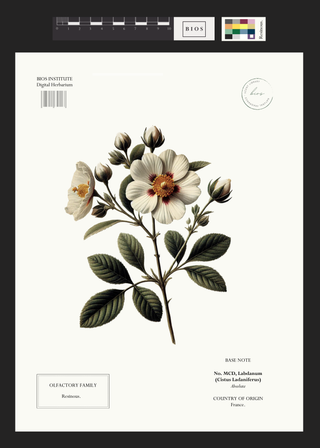

Cistus ladanifer, commonly known as gum rockrose or labdanum, is native to the western Mediterranean region. Its natural range includes countries such as Spain, Portugal, southern France, Morocco, and parts of Algeria. Ours is sourced from France.
Gum rockrose is an evergreen shrub known for its resinous leaves and attractive flowers. The leaves contain a sticky resin, known as labdanum, which has been historically used in perfumery and as a fixative in incense.
Labdanum has a warm, rich, and resinous scent with sweet, balsamic, and slightly animalic undertones. It is often described as sensual, complex, and captivating. Labdanum's aroma can vary depending on the origin and extraction method, but it generally adds depth, warmth, and character to perfumes.
Labdanum has excellent fixative properties, which means it helps to prolong the longevity of other fragrance ingredients and holds the scent together over time. It is a Base note in our Resinous family.
Labdanum is often used by perfumers to create rich and complex fragrances. Its deep and resinous character adds a touch of sophistication and sensuality to perfume compositions. Labdanum can be found in various types of perfumes, including oriental, woody, and amber fragrances.
Labdanum's unique aroma and versatile properties make it a valuable ingredient in perfumery. Its historical significance, cultural associations, and ability to enhance fragrance compositions contribute to its popularity among perfumers and fragrance enthusiasts.
Labdanum has a rich history dating back to ancient civilizations. It was highly valued by ancient Egyptians, Greeks, and Romans, who used it for various purposes, including medicinal, cosmetic, and religious practices. It was often burned as incense in religious ceremonies and used in perfumes and ointments.
Labdanum is associated with spirituality, purification, and transformation in some cultures. Its deep and resinous aroma is believed to have grounding and calming effects, making it suitable for rituals, meditation, and spiritual practices.
In certain cultures, labdanum has been used in traditional herbal medicine for its believed healing properties. It has been used to treat respiratory ailments, skin conditions, and wounds. Labdanum is sometimes infused into oils or applied topically in traditional remedies.
Labdanum has been mentioned in folklore and mythology of different cultures. In some legends, it is associated with gods, goddesses, or mythical creatures. For example, in Greek mythology, it is believed that labdanum was used as an offering to the gods.
Labdanum has been a part of cultural practices and rituals in various regions. It may be used during religious ceremonies, festivals, or rites of passage to create a sacred and aromatic atmosphere. Its scent is believed to have a purifying and protective effect, helping to ward off negative energies or attract positive ones.
In some cultures, labdanum resin has been used for traditional crafts. It may be incorporated into the creation of scented candles, soaps, or other handmade products that carry cultural significance or have ceremonial uses.
Labdanum
- Unit price
- /per
Please note this product format is a small vial that contains roughly 20 drops of scent concentrate. This can be purchased à la carte but is intended to be used with our Perfume Kit.
SCENT SPECIFICATIONS
Latin Name: Cistus Ladaniferus
Extraction Method: Solvent Extracted
Country of Origin: France
All of the scents in our library are naturally derived - our collection includes essential oils, absolutes, concretes, isolates, enfleurage, macerations, oleoresins, and mixed medium naturals.
Adding product to your cart
Cistus ladanifer, commonly known as gum rockrose or labdanum, is native to the western Mediterranean region. Its natural range includes countries such as Spain, Portugal, southern France, Morocco, and parts of Algeria. Ours is sourced from France.
Gum rockrose is an evergreen shrub known for its resinous leaves and attractive flowers. The leaves contain a sticky resin, known as labdanum, which has been historically used in perfumery and as a fixative in incense.
Labdanum has a warm, rich, and resinous scent with sweet, balsamic, and slightly animalic undertones. It is often described as sensual, complex, and captivating. Labdanum's aroma can vary depending on the origin and extraction method, but it generally adds depth, warmth, and character to perfumes.
Labdanum has excellent fixative properties, which means it helps to prolong the longevity of other fragrance ingredients and holds the scent together over time. It is a Base note in our Resinous family.
Labdanum is often used by perfumers to create rich and complex fragrances. Its deep and resinous character adds a touch of sophistication and sensuality to perfume compositions. Labdanum can be found in various types of perfumes, including oriental, woody, and amber fragrances.
Labdanum's unique aroma and versatile properties make it a valuable ingredient in perfumery. Its historical significance, cultural associations, and ability to enhance fragrance compositions contribute to its popularity among perfumers and fragrance enthusiasts.
Labdanum has a rich history dating back to ancient civilizations. It was highly valued by ancient Egyptians, Greeks, and Romans, who used it for various purposes, including medicinal, cosmetic, and religious practices. It was often burned as incense in religious ceremonies and used in perfumes and ointments.
Labdanum is associated with spirituality, purification, and transformation in some cultures. Its deep and resinous aroma is believed to have grounding and calming effects, making it suitable for rituals, meditation, and spiritual practices.
In certain cultures, labdanum has been used in traditional herbal medicine for its believed healing properties. It has been used to treat respiratory ailments, skin conditions, and wounds. Labdanum is sometimes infused into oils or applied topically in traditional remedies.
Labdanum has been mentioned in folklore and mythology of different cultures. In some legends, it is associated with gods, goddesses, or mythical creatures. For example, in Greek mythology, it is believed that labdanum was used as an offering to the gods.
Labdanum has been a part of cultural practices and rituals in various regions. It may be used during religious ceremonies, festivals, or rites of passage to create a sacred and aromatic atmosphere. Its scent is believed to have a purifying and protective effect, helping to ward off negative energies or attract positive ones.
In some cultures, labdanum resin has been used for traditional crafts. It may be incorporated into the creation of scented candles, soaps, or other handmade products that carry cultural significance or have ceremonial uses.
